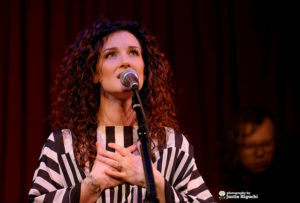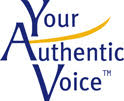I know you’ve watched presenters who seem to be “calling in” their presentation. They may know their stuff, and even be very polished, but you just don’t believe them. You’re certainly not motivated to act on their information. What’s missing?
In many cases, what’s missing is their own connection to the message. They haven’t found their own truth in it and allowed that truth to enliven their presentation.
You see, no matter how technically great we are, if we haven’t found our own truth in our material, it will feel contrived. No matter how much we rehearse, if we haven’t connected the dots for ourselves, we will come off as inauthentic and possibly slick.
In order to connect those dots, we need to answer one simple, but at times challenging, question:
Do I know this to be true for myself, and if so, why is it important I share this with others?
 When we can answer this question for all the information we’re presenting — when we personally know how our message can positively impact others and that it connects with our own values and experience — our audiences get that. They feel that in us. They believe us, and so we become trustworthy. This is at the very core of having “presence” — that energy that positively connects us with our audience through more than our words and visuals. When we rehearse with this knowledge, instead of showing up as canned or scripted, our planning, preparation and rehearsal all support us to show up even more authentically.
When we can answer this question for all the information we’re presenting — when we personally know how our message can positively impact others and that it connects with our own values and experience — our audiences get that. They feel that in us. They believe us, and so we become trustworthy. This is at the very core of having “presence” — that energy that positively connects us with our audience through more than our words and visuals. When we rehearse with this knowledge, instead of showing up as canned or scripted, our planning, preparation and rehearsal all support us to show up even more authentically.
This is particularly important when we’re giving a presentation we didn’t develop. When the words and the visuals aren’t ours, it’s essential we make them ours. No matter what the purpose of the presentation is, asking that question so we can sincerely deliver the material will ensure we fulfill our commitment to our organization and our listeners
I go through this process with my clients because when they can answer this question, it elevates their delivery tremendously. They become more authoritative and natural in their gestures and their facial expressions. They are calmer and at the same time more enthusiastic. They find their “authentic voice” because they are telling the truth. Their truth. And the truth sets them free.
This seems simple. Some of the simplest things are also the most difficult. Finding and expressing our truth, whether we’re advocating for those who are homeless, or selling ice cream, takes time and concentrated focus. Make sure you take that time to ask yourself that question before your next presentation. Let me know what happens!
I would love to support you to find your truth and express it with enthusiasm and conviction! You can contact me at Andrea@AndreaBeaulieu.com.
Photo courtesy of Flickr user Justin Higuchi

Leave A Comment